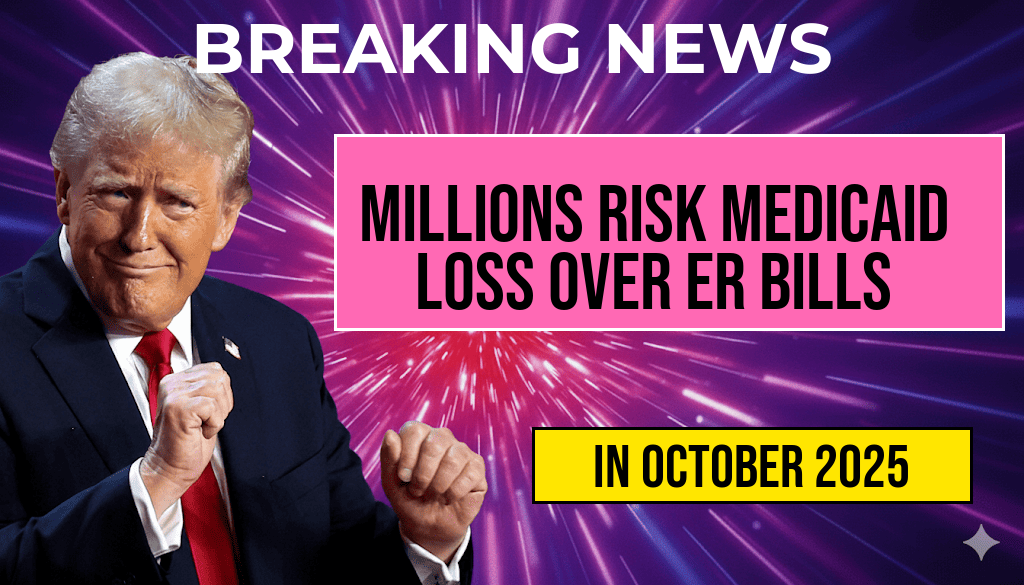As the U.S. grapples with the ongoing ramifications of healthcare policy changes, millions of Americans may face potential losses in their Medicaid coverage. The Congressional Budget Office (CBO) recently raised alarms regarding the implications of a $1,000 emergency room bill, emphasizing the dire circumstances that could arise from such unexpected healthcare expenses. Many individuals who rely on Medicaid might find themselves in perilous situations, unable to access critical medical services, as states begin to unwind pandemic-era protections. This article explores the potential fallout from the CBO’s warning, the financial burden of emergency medical care, and what this means for the future of Medicaid recipients across the nation.
The CBO’s Warning and Its Implications
The CBO’s report highlights a concerning trend: as states navigate the post-pandemic landscape, an estimated 15 million individuals could lose their Medicaid coverage. This statistic is particularly alarming given the rising costs of healthcare, especially emergency services. A $1,000 bill for an emergency room visit can be staggering for many families, particularly those living paycheck to paycheck.
Understanding the Financial Burden
The financial strain of healthcare costs can lead to devastating outcomes for families. Emergency room visits are often unpredictable, and when faced with a substantial bill, many individuals may opt to forgo necessary medical care altogether. According to [Forbes](https://www.forbes.com), nearly 20% of Americans have delayed or avoided necessary healthcare due to cost concerns. This trend raises questions about the long-term health implications for those losing Medicaid coverage.
Factors Contributing to Coverage Loss
- End of Pandemic Protections: Many states are rolling back the additional benefits that were implemented during the COVID-19 pandemic, including expanded Medicaid eligibility.
- Income Fluctuations: Changes in household income can affect eligibility, particularly as families recover from the economic fallout of the pandemic.
- Administrative Barriers: Some individuals may face challenges in re-enrolling due to confusing paperwork or lack of access to information.
The Impact on Vulnerable Populations
The potential loss of Medicaid coverage primarily affects low-income populations, including children, the elderly, and individuals with disabilities. A significant portion of these groups relies on Medicaid for essential healthcare services, including preventive care and chronic disease management. The CBO’s findings suggest that without proper coverage, many may find themselves in precarious health situations.
Emergency Care Costs and Access
The average cost of an emergency room visit can vary significantly, but a bill of $1,000 is not uncommon. This expense can deter individuals from seeking treatment, leading to complications that may require even more costly interventions later. The lack of timely medical care can exacerbate health disparities, particularly in marginalized communities.
Looking Ahead: Policy Considerations
As the situation unfolds, policymakers face critical decisions regarding the future of Medicaid and emergency healthcare access. Advocates for health equity argue that maintaining robust Medicaid coverage is essential to ensure that vulnerable populations do not fall through the cracks. Efforts are underway to push for legislative changes that would protect Medicaid recipients from abrupt coverage loss.
Potential Solutions
- Continuing Pandemic Protections: Some states are considering extending protections to maintain coverage for those at risk of losing it.
- Outreach Programs: Increased efforts to educate individuals about their healthcare options and enrollment procedures can mitigate loss of coverage.
- Financial Assistance Programs: Implementing programs to help cover emergency care costs can prevent individuals from avoiding necessary treatment.
Conclusion
The warning from the CBO underscores a critical moment for Medicaid recipients and the healthcare system at large. As millions stand to lose their coverage, the ramifications extend beyond financial strain; they touch on the very fabric of public health in America. Stakeholders must navigate these challenges carefully to ensure that all individuals, regardless of their financial situation, have access to the healthcare they need.
For further reading on Medicaid and healthcare costs, visit [Wikipedia](https://en.wikipedia.org/wiki/Medicaid) and [Forbes](https://www.forbes.com/wellness/healthcare-costs/).
Frequently Asked Questions
What is the main concern regarding Medicaid coverage as reported by the CBO?
The CBO warns that millions could face Medicaid coverage loss due to rising healthcare costs, particularly highlighted by the impact of a $1,000 emergency room bill.
How many people are expected to lose Medicaid coverage?
According to the report, millions of individuals could be affected by the upcoming changes in Medicaid eligibility and funding, leading to significant coverage loss.
What factors are contributing to the potential loss of Medicaid coverage?
Factors include increasing healthcare costs, such as the recent rise in emergency room bills, which could push individuals above the income thresholds necessary to qualify for Medicaid.
What can individuals do if they lose their Medicaid coverage?
If individuals lose their Medicaid coverage, they should explore other health insurance options such as Marketplace plans or check their eligibility for other government assistance programs.
What is the significance of the $1,000 emergency room bill mentioned in the article?
The $1,000 emergency room bill serves as a critical example of the rising healthcare costs that may affect Medicaid eligibility and ultimately lead to a loss of coverage for many individuals.






